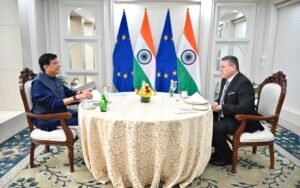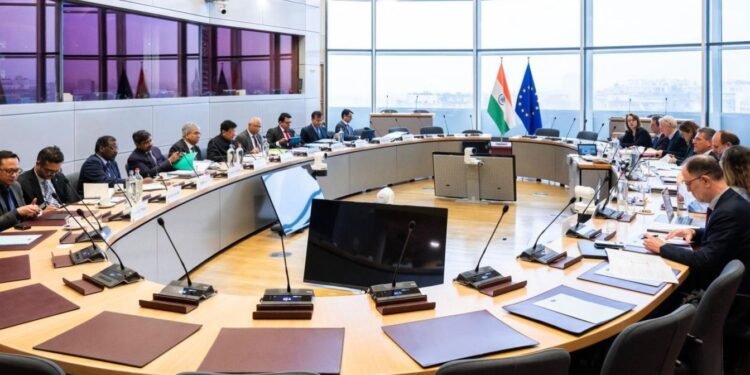📝 A.Mendonca
Trade between India and European Union (EU) has grown by around 90% in the past decade, but the Free Trade Agreement (FTA) talks have stalled over the years due to some differences. In a significant step towards strengthening economic ties, India and the EU are making concerted efforts to accelerate negotiations on a long-awaited FTA after the recent visit of EU President Ursula von der Leyen. Both sides aim to conclude the deal by the end of 2025, setting the stage for a deeper and more strategic partnership in the years ahead.
On March 1 this year, Commerce and Industry Minister Piyush Goyal met with EU Commissioner for Trade and Economic Security Maros Sefcovic in Mumbai to discuss the roadmap for finalizing a balanced and mutually beneficial agreement. “Our discussions focused on accelerating efforts towards a balanced and mutually beneficial free trade agreement. Looking forward to deepening economic ties and fostering a prosperous India-EU partnership,” Mr. Goyal stated. Tenth round of negotiations, which has already begun in Brussels (March 10-14), is expected to address key sticking points, including tariff reductions on automobiles and wines, a stronger intellectual property rights framework, and India’s demand for data security status for its IT sector. The agreement also aims to enhance investment protection and recognize geographical indications, thereby further strengthening economic collaboration between the two regions.

India and the EU have steadily deepened their partnership over the past decade, driven by shared values of democracy, multilateralism, and economic growth. Bilateral trade surged from €78 billion in 2014 to an estimated €135 billion in 2023, with the EU remaining India’s third-largest trading partner. The EU accounts for about 17% of India’s exports, with major goods such as ready-made garments, pharmaceuticals, steel, and petroleum products benefiting from stronger economic ties. Despite past roadblocks, including the suspension of FTA negotiations in 2013 due to differences over market access, discussions resumed in 2022 with renewed optimism. The geopolitical landscape, particularly tensions arising from the U.S. tariff policy and the Russia-Ukraine war, has further underscored the importance of diversifying trade partnerships. Beyond trade, India and the EU are forging closer ties in key strategic areas, including climate change, digital transformation, and security. The 2023 India-EU Clean Energy Partnership earmarked €1 billion for solar projects and grid modernization, reflecting a shared commitment to sustainability. European investments in India exceed $117 billion, with around 6,000 EU-based companies present in the country. Conversely, Indian investments in the EU stand at approximately $40 billion, strengthening India’s footprint in European markets. Furthermore, the India-EU Trade and Technology Council (TTC), established in 2023, has emerged as a key platform for collaboration in semiconductors, artificial intelligence, and cybersecurity. As global supply chains undergo restructuring, India’s role as an alternative manufacturing hub to China has become increasingly significant.
While optimism surrounds the FTA, challenges remain. The EU’s Carbon Border Adjustment Mechanism (CBAM), seen by India as a potential trade barrier, and ongoing disputes over data localization policies require careful negotiation. Moreover, India’s emphasis on strategic autonomy contrasts with the EU’s preference for a unified stance on global geopolitical crises, including the Russia-Ukraine conflict. However, both sides are determined to overcome these hurdles. The 25th India-EU Summit, scheduled for later this year, is expected to cement the trade pact and introduce new digital governance and defense initiatives. Experts view the evolving relationship as a cornerstone of 21st-century geopolitics. “India and the EU are natural allies in a multipolar world. Their ability to merge economic pragmatism with democratic ideals will shape global stability and prosperity,” said analyst Priya Sharma. As negotiations gain momentum, the India-EU partnership is poised to enter a transformative phase, redefining economic cooperation and global governance in the years ahead.







